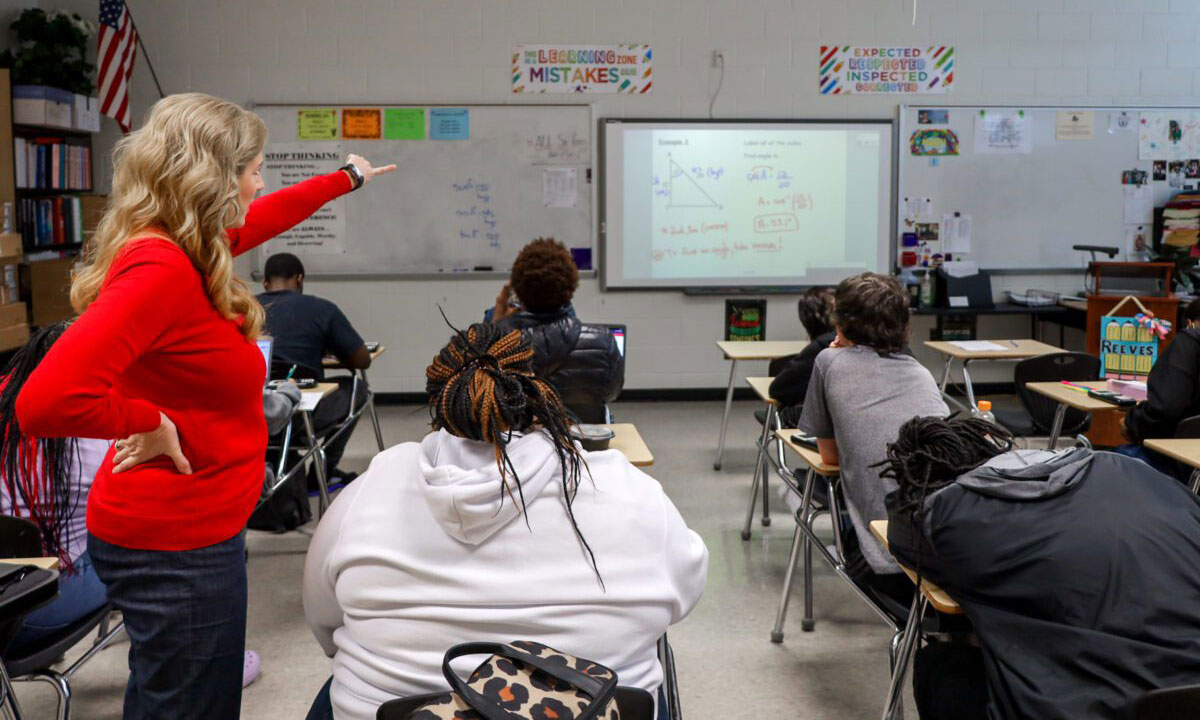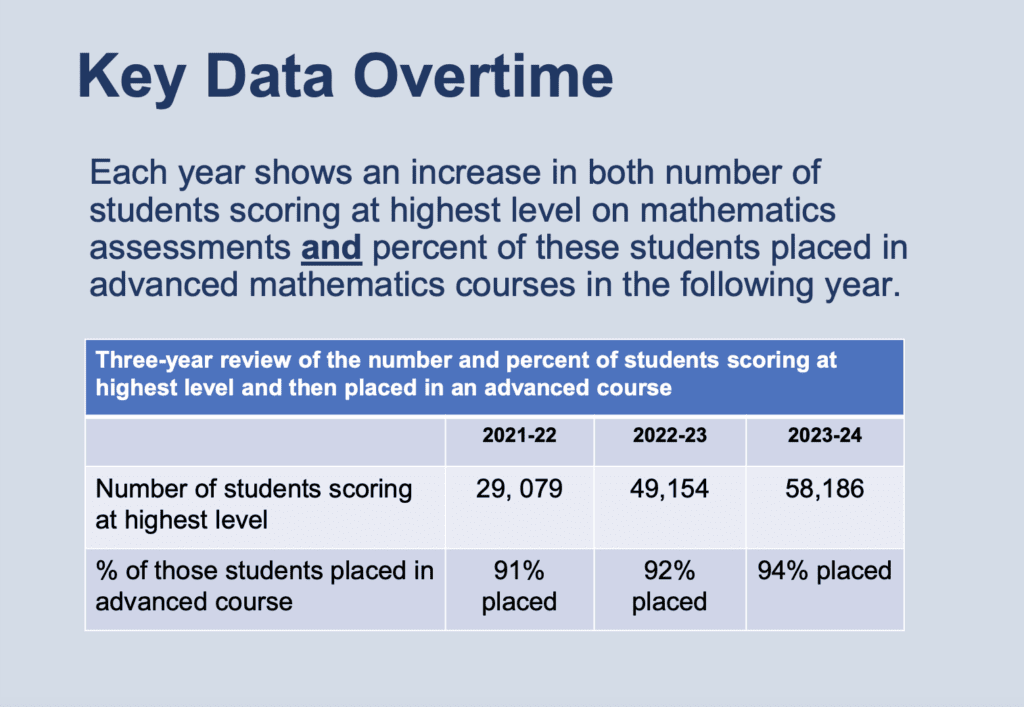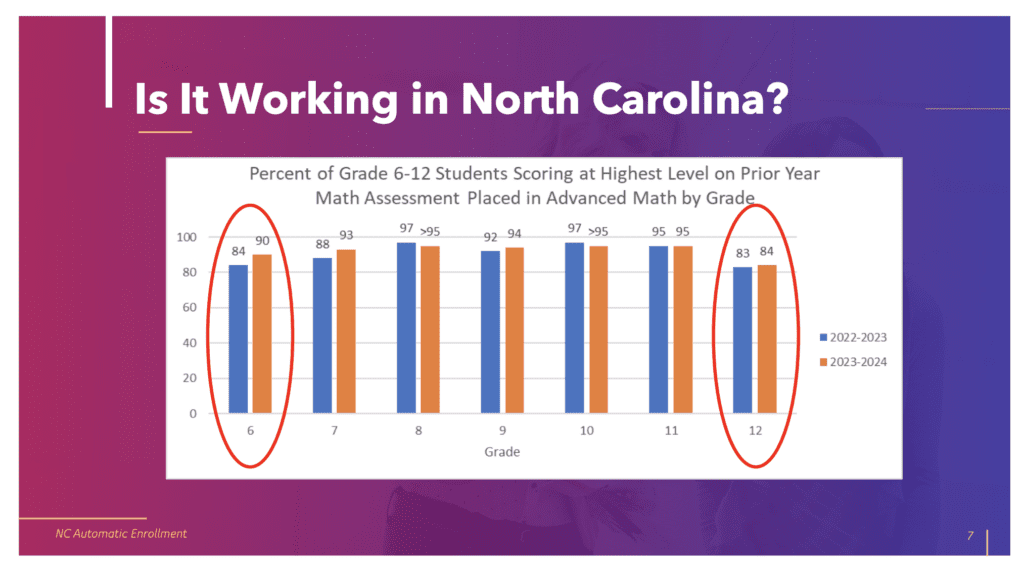North Carolina Works to Expand Access to Advanced Math Courses
More than 58,000 students were eligible for placement in advanced math courses in grades 6-12 during the 2022-23 school year.

Get stories like this delivered straight to your inbox. Sign up for The 74 Newsletter
More than 58,000 students were eligible for placement in advanced math courses in grades 6-12 during the 2022-23 school year, Department of Public Instruction (DPI) Deputy State Superintendent Dr. Michael Maher told lawmakers on Tuesday during a Joint Legislative Education Oversight Committee (JLEOC) meeting.
The number of students eligible for advanced math courses increased more than 18% from 2021-22 — by 9,032 exam scores. Of those eligible students, 94% are currently enrolled in an advanced math course, Maher said.
“We have an increase in both the number of students scoring at the highest level on their math assessment, in addition to the percent of those students placed in the advanced math course,” Maher told lawmakers. “We are clearly seeing huge increases in the number of students participating.”
Maher’s presentation was part of a larger discussion with legislators about advanced math courses — and the importance of automatic enrollment policies that place all students with qualifying scores in advanced courses.
North Carolina lawmakers passed legislation in 2018 to expand access in advanced courses. The goal, according to DPI’s presentation, was “to guarantee the opportunity to access advanced coursework in mathematics for those students who demonstrate readiness, regardless of student’s address and demographic factors.”
Here is a look at that statute. Note that qualifying students are automatically enrolled in the next advanced math course, unless a parent or guardian opts out.
When advanced courses are offered in mathematics, any student scoring a level five on the end-of-grade or end-of-course test for the mathematics course in which the student was most recently enrolled shall be enrolled in the advanced course for the next mathematics course in which the student is enrolled. A student in seventh grade scoring a level five on the seventh grade mathematics end-of-grade test shall be enrolled in a high school level mathematics course in eighth grade. No student who qualifies under this subsection shall be removed from the advanced or high school mathematics course in which the student is enrolled unless a parent or guardian of the student provides written consent for the student to be excluded or removed from that course.” – SESSION LAW 2018-32, Advanced courses in mathematics
Johns Hopkins University School of Education Associate Dean Dr. Jonathan Plucker said automatic enrollment policies are important to student success.
“Course placement can be fairly arbitrary and biased,” Plucker told lawmakers. “Parents shouldn’t have to have the social capital… and knowledge about how schools work to go in and fight for our children. It should be automatic. If you perform at a high level, you should be in advanced courses.”
North Carolina is one of just six states with automatic enrollment in these courses, and it’s the only one collecting “data showing whether it’s actually working or not,” Plucker said.
Here is a look at participation in N.C. advanced math courses over the last three years.

Access and advanced courses
Nationally, “many high-performing students are not offered advanced learning opportunities even when there is clear evidence that they are ready for higher-level academics,” according to an analysis by The 74, co-written by Plucker and Best NC President and CEO Brenda Berg.
“This is especially true for Hispanic, Black, Native American and low-income students, leading to a chronic underchallenging of many of the nation’s brightest children. As a result, these students are less likely to be ready for postsecondary education,” the analysis says. “One obvious, but surprisingly underused, remedy is automatic enrollment. Also known as mandatory or opt-out enrollment, the concept is straightforward: Students who perform at the top of their classes are automatically placed in advanced courses for the following academic year.”
While other states are considering automatic enrollment policies, Plucker and Berg said “North Carolina is far ahead.” North Carolina’s policy begins in third grade and “specifically guarantees access to high school-level math for highly qualified middle schoolers.”
On Tuesday, Plucker told lawmakers the percentage of high-performing North Carolina students not placed in advanced math courses “has steadily and significantly dropped.”
“I would argue in terms of participation it absolutely is working. … There’s been progress across the board, which I think is very important,” Plucker said. “That’s probably due to several different factors. Pandemic recovery is probably part of it. But there’s no question that automatic enrollment is probably part of that too.”
In 2019, lawmakers updated the state statute to require an annual report from DPI on implementation. Here are a few highlights from the 2023 report:
- For eligible eighth grade students, data indicates the overall number and percentage of students placed in Math 1 or other advanced mathematics courses is again >95%. This reflect a 1% increase over the 2022-23 reporting year.
- That eighth grade increase is true across all race/ethnic groups, per the report. Before the legislation (2017-18), only 87% of eligible eighth grade students accessed N.C. Math 1 in eighth grade.
- Of students who qualified for advanced courses, 94% of white, 92% of Black, 92% of Hispanic, 88% of American Indian/Alaska Native, and more than 95% of Asian students actually enrolled in advanced math courses.
- Data indicates middle school students are more likely to access advanced courses beginning in sixth grade. Last year, 90% of eligible sixth grade students took an advanced math course.
- Across grades six-12, current data shows that 94% of both male and female eligible students enroll in advanced mathematics courses. This is an increase of 2% for females and 3% for males from the previous year.
“Several districts have reported that the policy helped to accelerate students who might otherwise have been overlooked,” The 74 analysis says. “Districts responded to the legislation by developing partnerships between middle and high schools, expanding virtual instruction, personalizing support based on students’ needs and increasing access to advanced education for students who previously were not offered such opportunities.”
You can view the Johns Hopkins School of Education report, which served as background for The 74 article, here. You can also view DPI’s full presentation here.
Future possibilities for automatic enrollment and math
Plucker raised several opportunities for automatic enrollment in the future:
- North Carolina could expand automatic enrollment to other content areas, such as English Language Arts or science.
- Creating more opportunities for students who ask to take advanced courses to be able to do so. “If students self nominate, they should be given a chance,” he said.
- Continuing efforts to teach math more effectively, including teacher prep, high-quality curriculum, and and emphasis on research and evaluation.
Maher said schools also must offer support for students who place in advanced coursework for the first time.
“Next steps will be to continue to review our data for disparities and looking for other opportunities,” he said. “We are also interested in conversations around extending auto enrollment to other subjects.”

Plucker also raised the following research questions for North Carolina:
- Why are there lower rates of participation in sixth and 12th grade? Are there ways to address this?
- What’s happening at the elementary school level? What are districts doing to get more students to advanced performance?
- What strategies have districts used most successfully to increase access? What hasn’t worked?
- How are districts using automatic enrollment to complement other advanced education services?
- What is the impact of automatic enrollment on a wide range of student outcomes?
Above all, Plucker and Maher stressed that state leadership should continue to stress both remediation and excellence when it comes to math.
“We are very interested in not only continuing to work at supporting students at the highest level of math, but also reaching students who are being underserved right now in mathematics — in an effort to accelerate math learning for for all children,” Maher said.
This article first appeared on EducationNC and is republished here under a Creative Commons license.
Get stories like these delivered straight to your inbox. Sign up for The 74 Newsletter

;)